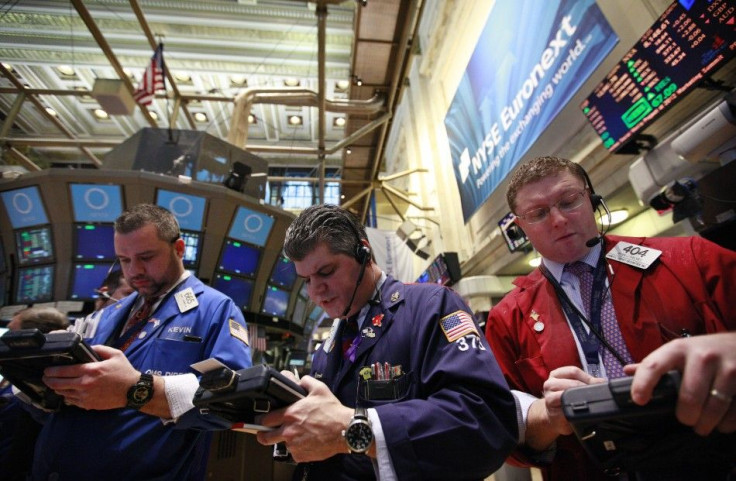Jobs Reports Could Fuel Continued Rally in Stocks
Wall Street Week Ahead

Stocks have proven the naysayers wrong so far in 2012. And the February employment situation summary on Friday could be just the ticket to keep the bulls going next week.
The five-month stock rally has been built on a string of improving economic data that suggests U.S. corporate profit growth will remain intact, according to some analysts.
Job growth is a big part of that picture. It has lagged most other parts of the U.S. economy, a point frequently raised by Republican presidential hopefuls.
But strategists have been calling for a pullback, especially since indexes are hitting new milestones and the fourth-quarter reporting period is winding down.
On Tuesday, the Dow Jones Industrial Average (DJI) closed above 13,000 for the first time since May 2008. Meanwhile, the Standard & Poor's 500 index (SPX) has risen eight of the last nine weeks, and this week it twice closed above 1,370, an intensely watched technical resistance level. In addition, the Nasdaq Composite index (COMP) at one point crossed above 3,000 this week and is trading at its highest level since 2000.
Some say staying on this path may be possible with further supportive news on the economy.
The rally will continue as long as better economic information continues. The question is 'Are we seeing some sustainable improvement in the economy?' I think the answer is 'Yes,' so I think there is going to be some continuation in the rally, said Bryant Evans, investment advisor and portfolio manager at Cozad Asset Management, in Champaign, Ill.
The government's jobs report for February, due on Friday, is expected to show nonfarm payrolls added 210,000 jobs last month, according to economists polled by Reuters, after gaining 243,000 in January. That would mark three straight months of solid job gains.
The U.S. unemployment rate is seen steady at a three-year low of 8.3 percent. It would also be further proof the economy is on the upswing. Among recent upbeat data was this week's report showing gross domestic product expanded in last year's fourth quarter at an annual rate of 3 percent -- the quickest pace since the second quarter of 2010.
Oil Raises a Red Flag
Investors are focusing more on economic data lately, with a bailout package for Greece in the works and U.S. earnings news winding down. But rising oil prices could create some anxiety.
Concern about supply disruptions from Middle Eastern oil producers has kept Brent crude oil above $120 a barrel, and analysts said that could affect the longevity of the stock market's rally.
The economy has a pretty good head of steam, and a few data points here or there isn't going to derail that. But if you have some exogenous shock from oil, all bets are off. Things can and do change in the short run, said Doug Foreman, director of equities at Kayne Anderson Rudnick in Los Angeles.
Higher oil prices mean higher costs for consumers and businesses -- and an even tougher time for Europe, which appears headed for a recession.
Greece's second bailout from the euro-zone countries will be in place once conditions are finalized. The first of the money can be paid out after the completion of a bond swap between Athens and private investors, which is to be concluded by March 9.
Those concerns aside, stocks' gains year to date could be reason enough for investors to pull back. The S&P 500 has risen 9 percent for the year so far.
Once you start hitting targets, that tells you something, said John Kosar, director of research with Asbury Research in Chicago. From a pure money-management standpoint, the S&P didn't make any money last year. If you're a manager and sitting on almost 10 percent profit as of March 1, wouldn't you want to take a little bit off the table?
The S&P 500 ended 2011 virtually unchanged.
The Economy in the Driver's Seat
But it's hard to argue with economic data: A stronger U.S. economy will create jobs and improve profits. That is seen as the key driver for the stock market's gains.
Even though the percentage of companies beating analysts' profit expectations is down from recent quarters, earnings growth for the fourth quarter is still at 9.4 percent, above a Jan. 3 growth estimate of 7.9 percent.
Earnings growth is down from recent quarters as well, but analysts said an improving economy will keep that growth from slowing too quickly, and it will help offset any negative effects from Europe's fiscal troubles.
In our view, so long as the employment situation continues to improve, we're on the right trajectory, said Thomas Villalta, portfolio manager for Jones Villalta Asset Management in Austin, Texas.
Besides the jobs report on Friday, next week brings an ADP private-sector employment report on Wednesday.
On Monday, Wall Street will get a snapshot of the U.S. services sector for February from the Institute for Supply Management.
The U.S. international trade deficit for January will be released on Friday, at the same time as the nonfarm payrolls report. Economists polled by Reuters expect the country's international trade deficit to have risen to $49 billion in January from $48.8 billion in December.
Among the remaining S&P 500 companies to report results, tax-preparation company H & R Block Inc. is on next week's agenda as well as filtration-equipment maker Pall Corp.
© Copyright Thomson Reuters 2024. All rights reserved.






















